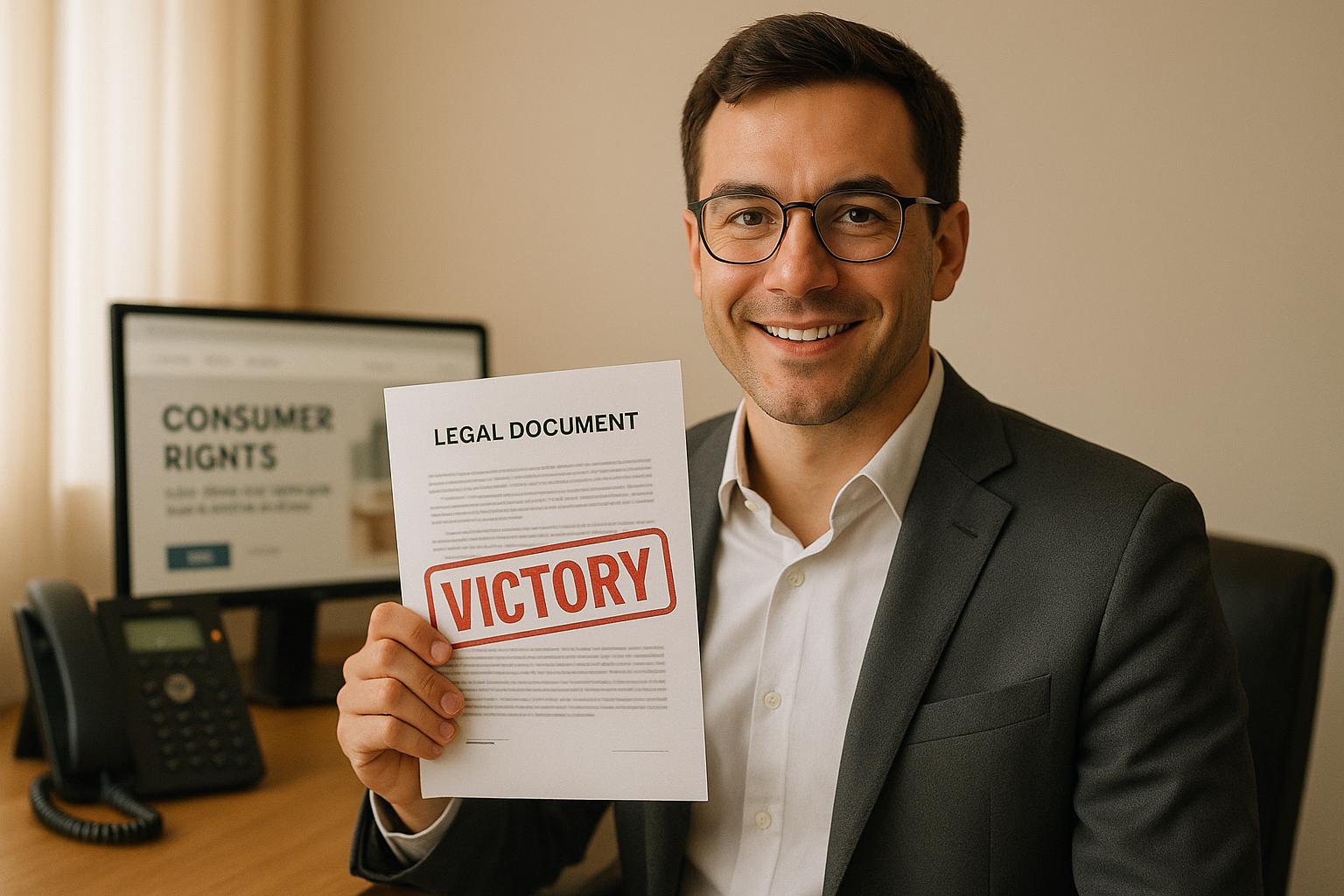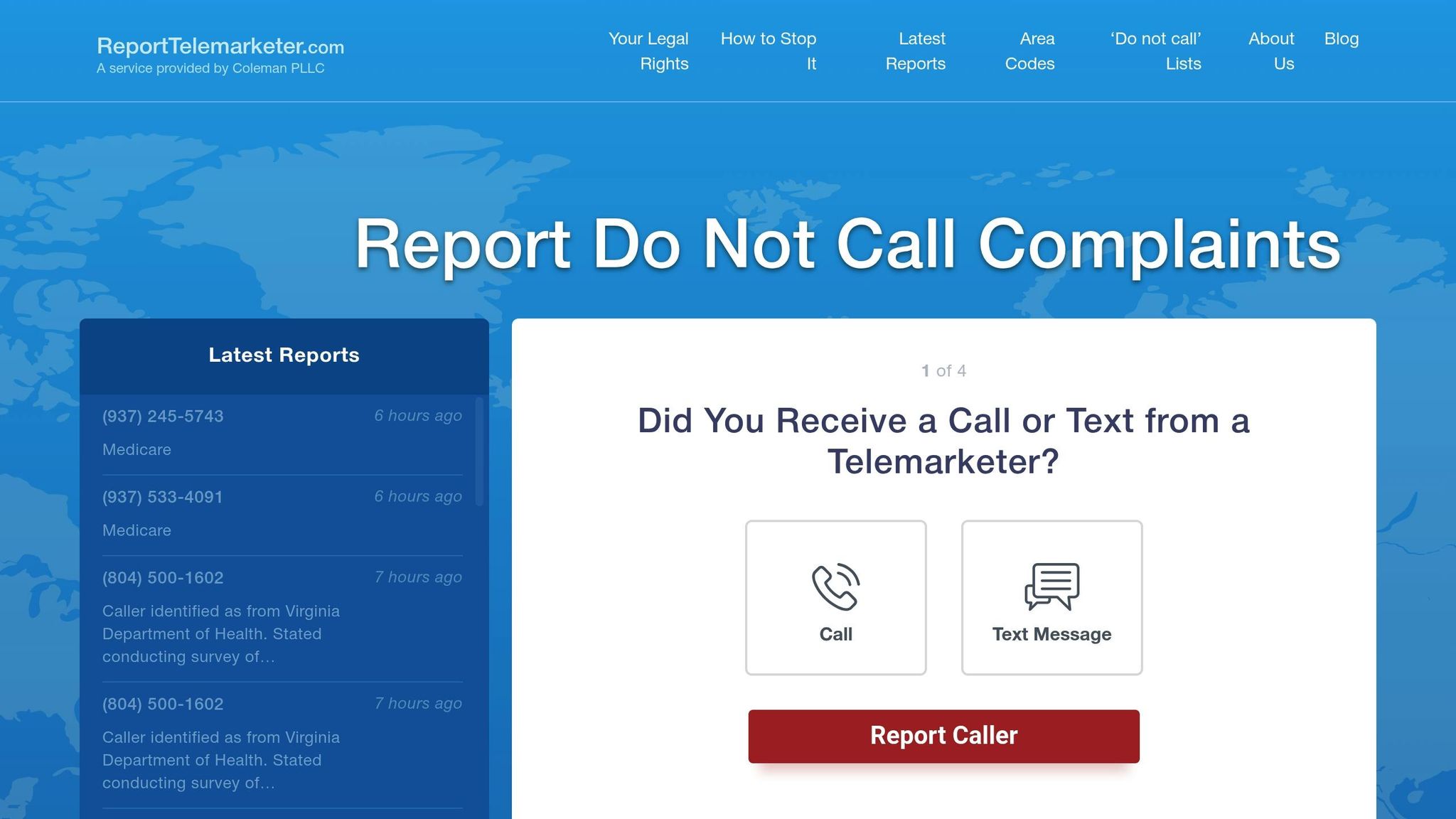
Tired of robocalls and spam texts? You can fight back – and win big. The Telephone Consumer Protection Act (TCPA) allows you to sue telemarketers for up to $500 per violation or $1,500 for willful misconduct. Here are three real-life cases where individuals and groups took action and secured massive payouts:
- ViSalus Case: A record-breaking $925 million judgment for 1.85 million illegal robocalls.
- Anywhere Real Estate Settlement: A $20 million class-action win for unauthorized calls to over 298,000 people.
- Quiet Hour Lawsuits: Companies like Disney, Steve Madden, and Regal Cinemas face lawsuits for sending messages outside legal hours, with penalties up to $1,500 per violation.
Key Takeaways:
- Document Everything: Save call logs, texts, and timestamps.
- Know Your Rights: Telemarketers need explicit consent to contact you.
- Act Fast: Legal deadlines for claims vary, so don’t wait.
You don’t have to put up with unwanted calls. Learn how these cases can inspire you to protect your privacy and even earn compensation.
I-TEAM: How to sue a telemarketer
Success Story 1: The $925 Million ViSalus Case
The Wakefield v. ViSalus, Inc. case holds the title of the largest TCPA damages award in history, showing that individuals can take on major corporations and win. In 2015, Lori Wakefield filed a class action lawsuit in the U.S. District Court for the District of Oregon against ViSalus, Inc..
At the heart of the case was ViSalus’s telemarketing campaign, which used prerecorded voice messages to promote its products and services. After a three-day trial, the jury determined that ViSalus had made 1,850,440 illegal robocalls, resulting in a staggering $925 million award – calculated at $500 per call. This landmark case offers critical lessons for navigating TCPA compliance and legal strategy.
Key Takeaways from the Case
Several factors contributed to the plaintiffs’ success. First, they demonstrated that ViSalus had conducted unauthorized telemarketing using prerecorded messages, violating consumer consent laws. This large-scale breach of privacy rights became the cornerstone of the case.
Another key element was the impact of evolving regulations. Initially, the consent ViSalus obtained for its calls was deemed adequate. However, changes in the law raised the bar for compliance. When the FCC attempted to grant a retroactive waiver, the court ruled that ViSalus had forfeited this defense by failing to raise it before trial. This regulatory shift serves as a cautionary tale for companies to stay vigilant and adapt to legal updates.
Wakefield’s legal team also showcased the power of persistence. Despite facing corporate legal tactics, they remained focused on the core issue: ViSalus had made 1,850,440 illegal robocalls, each carrying the full statutory penalty. Their strategy to maximize the $500 per call fine, with an additional enhancement of at least 20%, resulted in a record-breaking judgment.
Impact on Future TCPA Cases
Judge Simon’s response to ViSalus’s challenge has become a defining moment in TCPA law:
"The jury found ViSalus committed a stratospheric number of TCPA violations so it is no surprise that the TCPA’s constitutionally-valid minimum penalty of $500 for each violation has catapulted ViSalus’s penalty into the mesosphere."
The $925 million judgment served as a wake-up call for companies. It demonstrated that statutory damages of $500 to $1,500 per violation aren’t hypothetical – they can translate into massive penalties when violations occur on a large scale.
The case also highlighted the risks companies face when choosing trial over settlement in TCPA disputes. While some courts have significantly reduced large TCPA awards – like the Eighth Circuit’s reduction of a $1.6 billion judgment to $3.2 million – the ViSalus case proved that courts are willing to uphold substantial penalties when violations are well-documented.
For consumers, this case is a powerful example of how individual action can drive industry reform. The threat of similar judgments has forced telemarketers to rethink their practices and prioritize compliance measures.
Lastly, the ViSalus case underscores the importance of thorough documentation and persistence. Wakefield’s legal team meticulously proved that ViSalus made exactly 1,850,440 illegal robocalls, showing how detailed evidence can make or break a TCPA claim.
Success Story 2: Anywhere Real Estate Class-Action Settlement

The Bumpus, et al. v. Realogy Holdings Corp., et al. case demonstrates how consumers can take a stand against corporations for violating the Telephone Consumer Protection Act (TCPA). This class-action lawsuit against Anywhere Real Estate (formerly Realogy) resulted in a $20 million settlement, compensating nearly 300,000 affected individuals.
At the heart of the case were Realogy’s telemarketing practices, carried out through its Coldwell Banker franchise. Agents made an estimated 700,000 automated calls, targeting homeowners in states like California, Minnesota, and Florida. Many of these calls encouraged homeowners to list their properties for sale – even when the recipients were listed on the National Do Not Call Registry.
The class-action lawsuit included 298,494 members across three categories, covering over 445,000 unique cellphone numbers. Of these, 131,892 numbers were part of the National Do Not Call Registry class, and 201,001 were linked to prerecorded message violations [22,23].
What Led to the Settlement
The plaintiffs successfully demonstrated that Realogy violated the TCPA by making unauthorized calls to individuals listed on the National Do Not Call Registry and by using prerecorded messages without consent.
The complaint exposed a pattern of disregard for privacy laws, as outlined in the following statement:
"Despite the widespread embrace of the National Do Not Call Registry, companies like the defendant flagrantly ignore the Registry and invade the privacy of consumers with unwanted calls."
The plaintiffs meticulously documented calls made by Coldwell Banker-affiliated agents, using auto-dialing systems to establish a clear, years-long pattern of illegal activity.
Timing also played a key role in the settlement. Realogy’s legal team acknowledged the risks of facing a jury trial, particularly given the potential for statutory damages of $500 to $1,500 per violation. They noted:
"It would be imprudent to take any risk of an annihilating statutory-damages judgment, given that the real estate brokerage industry is in the third year of the worst real estate market in half a century."
Facing significant financial exposure, Realogy opted to settle rather than risk a potentially devastating judgment. This resolution underscores the importance of holding corporations accountable for privacy violations.
What Consumers Can Learn
The Anywhere Real Estate case offers important takeaways for anyone dealing with telemarketing harassment. First and foremost, it highlights the power of detailed documentation. The plaintiffs’ success hinged on their ability to provide clear evidence of violations.
The settlement also underscores the financial consequences of TCPA violations. Eligible claimants received an average payout of approximately $281, demonstrating that even smaller individual awards can add up to meaningful penalties for corporations.
Eligibility for compensation included consumers who received two or more telemarketing calls from Coldwell Banker-affiliated agents using automated dialers within a 12-month period between June 11, 2015, and December 3, 2020, while listed on the National Do Not Call Registry. Those who received prerecorded messages during the same timeframe also qualified, with a claim deadline set for July 3, 2025.
This case underscores the importance of knowing your rights under the TCPA, which requires telemarketers to obtain explicit consent before making promotional calls. For consumers dealing with persistent telemarketing issues, the Anywhere Real Estate settlement serves as a reminder that even large corporations can be held accountable when faced with determined individuals armed with solid evidence.
sbb-itb-a8d93e1
Success Story 3: Recent Wins in Quiet Hour Cases
A fresh wave of TCPA lawsuits has emerged, targeting companies for violating quiet hour rules by sending marketing messages at prohibited times. Since late 2024, there’s been a sharp increase in class action lawsuits, with a noticeable spike in early 2025. A Florida-based law firm alone has filed over 100 complaints since November 2024, focusing on cases in Florida and California District Courts. High-profile companies like Disney, Steve Madden, Dave & Buster’s, R.J. Reynolds Tobacco Company, and Regal Cinemas have all been drawn into these legal battles.
This trend marks a strategic pivot in TCPA litigation. Instead of dealing with complex technical violations, such as issues with automatic dialing systems or the Do Not Call Registry, lawyers are now focusing on a simpler target: the timing of messages. Under the TCPA, marketing calls or texts are prohibited before 8:00 a.m. or after 9:00 p.m. in the recipient’s local time.
Why Quiet Hour Cases Are Gaining Momentum
Quiet hour violations are particularly effective for consumer protection efforts because they are easy to prove. Unlike other TCPA claims that involve technical analysis, these cases rely on straightforward evidence – timestamps. If a message is sent outside the allowed hours, the violation is clear and difficult to contest.
The penalties for TCPA violations are steep: $500 per infraction, which increases to $1,500 if the violation is deemed willful. When these fines are multiplied across large groups of affected consumers, the financial stakes rise quickly, often pushing companies to settle rather than risk a trial. The documentation requirements are minimal – consumers simply need to retain text messages showing the time they were received, while phone records automatically back up this information, creating a solid paper trail.
Social media has amplified awareness of these cases, connecting consumers with attorneys eager to pursue quiet hour violations. This straightforward approach has led to substantial legal settlements.
Examples of Recent Quiet Hour Settlements
In March 2025, R.J. Reynolds Tobacco Company faced a lawsuit for allegedly sending marketing texts between 7:15 a.m. and 7:36 a.m. local time. Disney DTC LLC was accused of sending promotional texts at 6:01 a.m. in the plaintiff’s time zone. Regal Cinemas also faced legal action for sending messages at 7:21 a.m., offering free popcorn.
Dave & Buster’s is currently dealing with potential class-wide liability in the Laureta v. Dave & Buster’s Inc. case, where the plaintiff claims to have received three marketing texts between 3:00 a.m. and 6:00 a.m.. Similarly, Steve Madden is the focus of Torres v. Steve Madden, Ltd., with allegations of texts sent before 8:00 a.m..
A particularly detailed case involves Summer Vibe Inc. (operating as Cupshe). Plaintiff Olivia Lee Pesce alleges receiving eight text messages outside the allowed hours between April 14, 2023, and November 17, 2023. This case highlights how repeated violations can add up to significant liability over time.
These examples show how companies across various industries – from tobacco and entertainment to fashion and dining – continue to struggle with quiet hour compliance. Often, these issues arise from inadequate systems for managing the timing of marketing communications. The consistent nature of these violations presents ongoing opportunities for legal action by consumers.
How to Protect Yourself and Sue Telemarketers
Take control of your rights and seek compensation by following these steps. The secret lies in understanding the laws that protect you, keeping detailed records of violations, and knowing when to get professional help.
How to Document Violations
Keeping accurate records is your best defense against telemarketing violations. As NW Debt Resolution explains:
"They won’t stop calling but court won’t just take your word that you identified who is calling you and how many times they called. Document your calls like a pro to hold intrusive telemarketers accountable for TCPA violations".
For every unsolicited call or text, make it a habit to record critical details like the date, time, caller ID, and any information the caller provides, such as their name, company, or contact details. Save screenshots of caller ID displays and text messages. If it’s a robocall, jot down any details mentioned during the call, including the company name or the purpose of the message. Be sure to document any requests you make to stop further calls and verify your registration on the National Do Not Call list.
Once you’ve compiled thorough records, you’ll be better equipped to leverage the protections offered under the TCPA.
Your Rights Under the TCPA
The Telephone Consumer Protection Act (TCPA) sets clear boundaries for telemarketers. Companies are prohibited from using automated dialing systems or prerecorded messages without your prior express written consent. Starting in early 2025, the TCPA will also require telemarketers to provide a simple way for you to revoke your consent, with such revocations taking effect within 10 business days. Additionally, telemarketers must include an interactive "opt-out" option in every robocall and are banned from contacting numbers listed on the National Do Not Call Registry unless they have explicit permission.
If a telemarketer violates these rules, you may be entitled to damages – $500 per violation or up to $1,500 for willful misconduct.
Using Tools Like ReportTelemarketer.com

While documenting violations and understanding your rights are essential, professional tools can make your case even stronger. Services like ReportTelemarketer.com can help you pursue claims against telemarketers. This platform allows you to report unwanted calls and texts, investigates the phone numbers involved, and identifies TCPA violations using advanced tools and consumer protection laws. If violations are confirmed, the service may send cease-and-desist letters or file formal complaints on your behalf. Best of all, it operates on a contingency basis, meaning attorney fees are recovered from the telemarketer.
When you file a report through ReportTelemarketer.com, Coleman, PLLC will review your case and evaluate possible legal actions, including lawsuits or class actions. To ensure your case is as strong as possible, provide complete and accurate details about the telemarketing calls or texts you’ve received.
Conclusion: Take Control of Your Privacy
The outcomes of cases like the $925 million ViSalus settlement, the Anywhere Real Estate class-action win, and recent quiet hour rulings highlight one key fact: telemarketers can be held accountable. These examples prove that companies violating the Telephone Consumer Protection Act (TCPA) face hefty financial penalties for each infraction.
These cases have also driven stronger enforcement efforts by federal agencies. As Senator Hollings, the original sponsor of the TCPA, once described these intrusive calls:
"the scourge of modern civilization. They wake us up in the morning; they interrupt our dinner at night; they force the sick and elderly out of bed; they hound us until we want to rip the telephone out of the wall".
You don’t have to endure this harassment. Take proactive steps: register your number on the Do Not Call Registry and enable spam protection features on your phone. If violations occur, keeping detailed records can significantly strengthen your case.
Understanding your rights gives you the power to take back control. Telemarketers who break the law rely on people ignoring their rights. But each TCPA violation could entitle you to damages ranging from $500 to $1,500 – and in states like Michigan, this amount can climb to $4,250 per illegal call. With proper documentation and tools like ReportTelemarketer.com, you can fight back without upfront costs since attorney fees are recovered from the telemarketer. Your privacy is worth protecting, and these cases show that with the right actions and evidence, you can put an end to unwanted calls and even be compensated for the inconvenience they’ve caused.
FAQs
What’s the best way to document telemarketing violations for a strong TCPA case?
To strengthen your case under the Telephone Consumer Protection Act (TCPA), start by keeping a thorough log of every unwanted call or text you receive. Be sure to jot down the date, time, phone number, and any identifiable details about the company or caller. This kind of documentation is essential for proving a consistent pattern of violations.
Hold onto any voicemails, screenshots of text messages, or other forms of communication. These records can serve as evidence to show that the contact was unsolicited and went against TCPA regulations. It’s also important to verify whether you ever gave consent for these communications since telemarketers are required to have your explicit permission before reaching out.
By following these steps, you’ll have the necessary proof to back up your claim and potentially pursue compensation for TCPA violations.
What kind of compensation can I expect if I sue a telemarketer for breaking the Telephone Consumer Protection Act (TCPA)?
If a telemarketer violates the Telephone Consumer Protection Act (TCPA) and you decide to sue, you could be entitled to a hefty payout. The law provides damages of up to $500 per violation, and that amount can jump to $1,500 per violation if it’s proven that the telemarketer acted knowingly or willfully. For instance, if a telemarketer made 1,000 illegal calls, you might claim as much as $500,000 – or even $1.5 million if willfulness is established.
TCPA lawsuits can sometimes lead to massive class-action settlements, with payouts running into the millions. Notable examples include settlements of $75.5 million and $61 million involving major corporations. By taking legal action, you’re not only standing up for your rights but also potentially earning significant compensation for the telemarketer’s unlawful behavior.
What should I do if I get telemarketing messages outside allowed hours?
If telemarketing messages are arriving before 8:00 AM or after 9:00 PM, it’s a clear violation of your rights under the Telephone Consumer Protection Act (TCPA). Here’s what you can do to address the issue:
- Save the evidence: Keep a record of the message, including the time it was sent and any details about the sender. This information can be crucial if further action is needed.
- Opt-out if possible: If the message includes an option to unsubscribe or stop further communication, follow those instructions. This could help prevent additional unwanted messages.
If the problem continues or the messages clearly break the law, you can escalate the matter. File a complaint with the Federal Communications Commission (FCC) or contact your state attorney general. You might also have the option to take legal action, with the potential to claim $500 to $1,500 for each violation under the TCPA.